|
 |
 |
 |
 |
|
Career
Profiles |
| Dr.
Robert Brock Fishery Biologist NOAA Fisheries Office of Science & Technology (ST)
At NOAA Fisheries, I currently lead ST’s
programs that support efforts to understand coastal ecosystems (coral
reefs and essential fish habitat), manage fisheries using an My task on this
cruise will be to assist in assessing the relationship between fish
density and distribution and habitat preference. By understanding
the importance of different habitat types to various life stages of
fish, one may be able to make more informed decisions on which areas
should potentially receive special protection and why. |
| Dr.
Sandra Brooke Post-Doctoral Fellow Oregon Insititute of Marine Biology 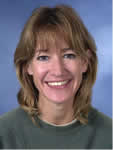 I
was born in a town not far from London and graduated with a B.Sc. (Hons)
in Biological Sciences from the University of Essex. After a further
two years and armed with a masters degree in pest and disease control
I went to Grand Cayman to work for the government in the Mosquito Control
Unit. There I learned to scuba dive and began to consider a change in
career path. I spent 2 years in Honduras working on a malaria program
and then began my career in marine science. I obtained an M.A from the
Virginia Institute of Marine Science, followed by my PhD from Southampton
Oceanography Center in England. My PhD research was primarily conducted
at Harbor Branch Oceanographic Institution in Florida with Dr Craig
Young. My dissertation research focused on the reproductive ecology
and larval biology and energetics of the Ivory Tree Coral (Oculina varicosa). I
was born in a town not far from London and graduated with a B.Sc. (Hons)
in Biological Sciences from the University of Essex. After a further
two years and armed with a masters degree in pest and disease control
I went to Grand Cayman to work for the government in the Mosquito Control
Unit. There I learned to scuba dive and began to consider a change in
career path. I spent 2 years in Honduras working on a malaria program
and then began my career in marine science. I obtained an M.A from the
Virginia Institute of Marine Science, followed by my PhD from Southampton
Oceanography Center in England. My PhD research was primarily conducted
at Harbor Branch Oceanographic Institution in Florida with Dr Craig
Young. My dissertation research focused on the reproductive ecology
and larval biology and energetics of the Ivory Tree Coral (Oculina varicosa).
My objectives on this cruise are to collect very small samples of live Oculina for genetic analysis, and to look for evidence of recruitment of new coral colonies onto a series of restoration modules that were deployed on damaged parts of the reef. 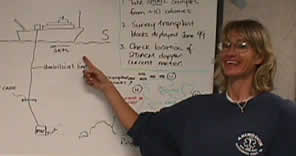
Apart from my own research I have also had the opportunity to work on many other interesting projects. These include culturing larvae of the giant tubeworm (Riftia pachyptila), from the hydrothermal vents, studying reproductive seasonality of Echinoderms from the Bahamian bathyal slopes and various animals from the cold seeps in the Gulf of Mexico. I am now a post-doctoral fellow at the Oregon Institute of Marine Biology, and am currently working with various other scientists on the ecology of deepwater scleractinian corals. |
Dewey Golub |
| Lance
W. Horn Operations Manager, National Undersea Research Center University of North Carolina at Wilmington
I now have over one thousand
dives and one thousand hours operating our Phantom S2 My role in the Oculina
cruise will be to supervise and operate the ROV for the scientists.
Strong currents and rugged terrain make this a difficult area to operate
in, but we’ll do what ever we can to get quality data and documentation.
We will pilot the ROV to points of interest to conduct transects with
the help of a computerized integrated navigation system, we will document
the habitat with high resolution video and digital still cameras,
and finally, we will take some samples of the coral with the manipulator
arm on the ROV. |
| Katherine
Jarrell Undergraduate Student, Marine Biology & Environmental Studies UNC Wilmington I graduated with honors from Cape Fear Community College in 1999 with an A.A.S. in Marine Technology. The promises of long offshore cruises were what prompted me to enroll. While I was there, I did co-ops with NOAA/National Marine Fisheries Service, and the University of Delaware, as well as numerous research cruises on our school’s ship, the R/V Dan Moore. In fall off 1999, I began classes at UNCW, and in May I will graduate with a B.S. in Marine Biology, as well as a B.S. in Environmental Studies. My main area of interest, and my true passion, lies in the conservation and preservation of reef ecosystems. I am an avid diver, and eventually want to move to Florida to perform reef research. I completed my RECON certification last year in Key Largo, and although I was aware of the degradation issues facing reefs, I was astounded at the extent of damage I saw when diving not just for fun, but for research. And it reinforced the fact that it is what I really want to do. Beginning this spring, I will be working for Cape Fear River Watch, a local environmental non-profit, as the Greenfield Lake Program Coordinator. The position runs through November, and after that, who knows! My role in the Oculina expedition is "data recording and sample processing". One of my main jobs will be watching the video transects as the ROV records, and marking locations on the video as it is recording. I believe I am serving as basic tech support. I feel honored that I was chosen to go, I will do whatever is needed, whether on deck or in the lab. |
| JOHN
K. REED Senior Research Specialist Division of Biomedical Marine Research Harbor Branch Oceanographic Institution Co-Principal Investigator- 2003 Mission to the Oculina Banks Habitat Area of Particular Concern (OHAPC)
Mr. Reed's research on the deep-water Oculina coral reefs off Florida since 1976 has resulted in over 45 publications and the establishment of a 300 sq.mi. Marine Protected Area for these reefs (http://www.hboi.edu/news/features/oculina.html). Mr. Reed’s primary objective on this mission will be to explore new potential reef sites and to characterize the coral habitat condition. He will also be comparing reefs sites from submersible dives made 20-25 years ago, to see any changes and the effects of bottom trawling on this fragile ecosystem. |
| Dr.
Leslie Sautter Director, Projectr Oceanica Associate Professor Department of Geology and Environmental Geosciences College of Charleston
Dr. Sautter participated in the NOAA Ocean Exploration Islands in the Stream 2001 and 2002 expeditions as a shipboard geologist, and is investigating the sediments and rocks collected during submersible dives from along the SAB's shelf-edge. She is currently examining the tiny single-celled benthic foraminifera that live in and among these shelf-edge hardground areas. Benthic foraminifera are excellent environmental and habitat indicators, yet their distribution in the SAB has not been well-documented. Sediments collected during the Oculina mission will be stained to identify living benthic "forams" for further study. Leslie and the Oceanica staff (including Dewey Golub and Rachel McEvers who participated on the October 2002 Oculina cruise) will be very involved before, during and after the Oculina mission with generating educational materials for the web. |
| Andy
Shepard Undersea technologies take humans to the ocean frontier. As a graduate student, I studied aquacultural engineering—farming the seas. My family from both sides raised tobacco in the Connecticut River valley. I sought to combine my love for the seas with this heritage. In order to clean our laboratory water intake filters, I learned to scuba and see the world beneath the waves for the first time—I was hooked! I have spent the last two decades using or providing advanced wet diving, submersibles and robots to go places to do scientific research that cannot be done from surface ships. My primary role with the National Undersea Research Center at UNCW is to develop new research programs and undersea expeditions off the southeast U.S. from North Carolina to Texas. My own research interests
involve the application of this in situ approach to a variety of issues,
including the impacts of fishing gear on continental shelf habitats.
I am also extensively involved in making the results of scientific
research more accessible to the public through information technology
and the Internet. The Oculina expedition will address both these career
interests for me. |
 Having
grown up on the shores of Provincetown, Massachusetts, at the end
of Cape Cod, and being the grandson of a Portuguese fisherman, how
could I not be interested in the ocean? I attended the University
of Massachusetts at Amherst where I majored in Fisheries Biology.
After one too many winters, I headed to the warmth of south Florida,
where I received a Bachelor of Science in Environmental Studies (Minor
in Marine Ecology) from Florida International University (Miami) and
a Master of Science in Marine Biology from the Nova University Oceanographic
Center (Ft. Lauderdale). Moving a little bit further north, I received
my Doctorate in Aquatic Ecology from the University of Florida.
Having
grown up on the shores of Provincetown, Massachusetts, at the end
of Cape Cod, and being the grandson of a Portuguese fisherman, how
could I not be interested in the ocean? I attended the University
of Massachusetts at Amherst where I majored in Fisheries Biology.
After one too many winters, I headed to the warmth of south Florida,
where I received a Bachelor of Science in Environmental Studies (Minor
in Marine Ecology) from Florida International University (Miami) and
a Master of Science in Marine Biology from the Nova University Oceanographic
Center (Ft. Lauderdale). Moving a little bit further north, I received
my Doctorate in Aquatic Ecology from the University of Florida.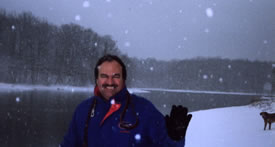 ecosystem-based approach (marine protected areas), invasive species,
and assists with international marine ecosystem science efforts.
ecosystem-based approach (marine protected areas), invasive species,
and assists with international marine ecosystem science efforts.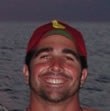 A love of the Ocean is what brought me to where I am today. I received
my B.S. in Marine Biology from The College of Charleston in South
CArolina in 1998. During my last semester of college I earned my diving
certification and became consumed with entering and interacting with
the underwater environment. To continue diving as much as possible
I moved to Palm Beach Florida after graduation. I participated in
diving as a Dive Master aboard a few of the locally operated dive
boats and learned much about the local species, habitats and their
interactions. During my time in Florida I was also involved with the
Marinelife Center of Juno Beach working as a Sea Turtle Biologist.
The center was a Turtle rehabilitation clinic as well as conducting
nesting surveys on five miles of very
A love of the Ocean is what brought me to where I am today. I received
my B.S. in Marine Biology from The College of Charleston in South
CArolina in 1998. During my last semester of college I earned my diving
certification and became consumed with entering and interacting with
the underwater environment. To continue diving as much as possible
I moved to Palm Beach Florida after graduation. I participated in
diving as a Dive Master aboard a few of the locally operated dive
boats and learned much about the local species, habitats and their
interactions. During my time in Florida I was also involved with the
Marinelife Center of Juno Beach working as a Sea Turtle Biologist.
The center was a Turtle rehabilitation clinic as well as conducting
nesting surveys on five miles of very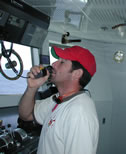 heavily nested beach. In the years after Florida I spent time with
a internet start-up in Boston learning technologies. The lure of the
ocean called again and I went to sea as a deckhand on 300+ ton motor
yachts. Not much science, but the chance to sea many diverse ocean
habitats from the large cold water species of the Pacific NorthWest
to the over fished Mediterranean. When I was recently offered the
chance to return to the College of Charleston and marine sciences
I jumped at it. Now I work up the education outreach websites that
accompany Scientific exploration and research in the SouthEast region.
During the Oculina mission I will be writing daily at-sea logs, helping
to answer your questions, participating in the research and will send
as much educational, informative information to the web site as possible.
heavily nested beach. In the years after Florida I spent time with
a internet start-up in Boston learning technologies. The lure of the
ocean called again and I went to sea as a deckhand on 300+ ton motor
yachts. Not much science, but the chance to sea many diverse ocean
habitats from the large cold water species of the Pacific NorthWest
to the over fished Mediterranean. When I was recently offered the
chance to return to the College of Charleston and marine sciences
I jumped at it. Now I work up the education outreach websites that
accompany Scientific exploration and research in the SouthEast region.
During the Oculina mission I will be writing daily at-sea logs, helping
to answer your questions, participating in the research and will send
as much educational, informative information to the web site as possible.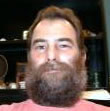 Although
I was raised in Ohio and didn’t see the ocean until I was seventeen,
I always knew that I wanted to be involved with oceanographic research.
After six years in the U.S. Navy and taking up scuba diving as a hobby,
I was wondering how I could make a career out of something that I
loved to do and somehow get paid for it. That led me to acquire an
Associates Degree from the Florida Institute of Technology, Jensen
Beach in Underwater Technology to become a hard hat, surface supply
diver. That’s how I got hired in 1985 by the National Undersea
Research Center at the University of North Carolina at Wilmington
(NURC/UNCW). We had a vessel called the R/V Seahawk that was set up
for surface supply diving, and I had many duties on the vessel besides
being a diver including decompression chamber operator, diver medical
technician, diver tender, diving bell operator, watch stander, and
deck hand. They also made me the vessel engineer since I was mechanically
inclined and had diesel, hydraulics, and compressor classes in school.
Upper management realized that there was not a lot of scientists that
wanted to do surface supplied diving and the science we supported
was limited to 300 feet, so the R/V Seahawk was sold in 1987. NURC/UNCW
began supporting scientists with nitrox scuba, leased submersibles,
and they purchased a small remotely operated vehicle (ROV), which
allowed us to cover a much larger portion of the entire water column.
Because I had been the engineer on the R/V Seahawk, they gave me the
ROV and told me to “go make it work.”
Although
I was raised in Ohio and didn’t see the ocean until I was seventeen,
I always knew that I wanted to be involved with oceanographic research.
After six years in the U.S. Navy and taking up scuba diving as a hobby,
I was wondering how I could make a career out of something that I
loved to do and somehow get paid for it. That led me to acquire an
Associates Degree from the Florida Institute of Technology, Jensen
Beach in Underwater Technology to become a hard hat, surface supply
diver. That’s how I got hired in 1985 by the National Undersea
Research Center at the University of North Carolina at Wilmington
(NURC/UNCW). We had a vessel called the R/V Seahawk that was set up
for surface supply diving, and I had many duties on the vessel besides
being a diver including decompression chamber operator, diver medical
technician, diver tender, diving bell operator, watch stander, and
deck hand. They also made me the vessel engineer since I was mechanically
inclined and had diesel, hydraulics, and compressor classes in school.
Upper management realized that there was not a lot of scientists that
wanted to do surface supplied diving and the science we supported
was limited to 300 feet, so the R/V Seahawk was sold in 1987. NURC/UNCW
began supporting scientists with nitrox scuba, leased submersibles,
and they purchased a small remotely operated vehicle (ROV), which
allowed us to cover a much larger portion of the entire water column.
Because I had been the engineer on the R/V Seahawk, they gave me the
ROV and told me to “go make it work.”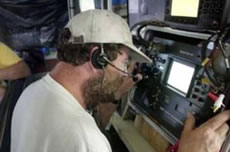 ROV. My goal with the ROV has always been to make it more than just
an “underwater eyeball.” It was important that the ROV
could be able to collect various kinds of data, samples, and measurements
other than video documentation. We have been upgrading and improving
the ROV over the years and it has proven to be a valuable asset for
supporting scientific research.
ROV. My goal with the ROV has always been to make it more than just
an “underwater eyeball.” It was important that the ROV
could be able to collect various kinds of data, samples, and measurements
other than video documentation. We have been upgrading and improving
the ROV over the years and it has proven to be a valuable asset for
supporting scientific research. John
Reed is a co-principal investigator for the 2003 Mission to the Oculina
Banks Habitat Area of Particular Concern (OHAPC). Mr. Reed is Department
Head of the Sample Acquisition and Taxonomy Program at the Division
of Biomedical Marine Research (DBMR), Harbor Branch Oceanographic
Institution (HBOI). He is Chief Scientist for DBMR in charge of supervising
and organizing >60 worldwide collection expeditions for biomedical
research with HBOI’s research vessels, submersibles, and land-based
expeditions. He is responsible for curating 30,000 specimens of marine
organisms in DBMR’s taxonomic museum collection and managing
the collection database, photographic library, and videotape library.
Mr Reed is also the Diving Safety Officer for all diving activities
from HBOI vessels and by a staff of 60 research divers. He has logged
35 deep-water lockout dives with helium-oxygen from Johnson-Sea-Link
submersibles, logged >2000 scientific scuba dives, and >150
scientific dives in the Johnson-Sea-Link and Clelia submersibles.
Mr. Reed received his B.S. from the University of Miami and M.S. specializing
in marine ecology from Florida Atlantic University in 1975.
John
Reed is a co-principal investigator for the 2003 Mission to the Oculina
Banks Habitat Area of Particular Concern (OHAPC). Mr. Reed is Department
Head of the Sample Acquisition and Taxonomy Program at the Division
of Biomedical Marine Research (DBMR), Harbor Branch Oceanographic
Institution (HBOI). He is Chief Scientist for DBMR in charge of supervising
and organizing >60 worldwide collection expeditions for biomedical
research with HBOI’s research vessels, submersibles, and land-based
expeditions. He is responsible for curating 30,000 specimens of marine
organisms in DBMR’s taxonomic museum collection and managing
the collection database, photographic library, and videotape library.
Mr Reed is also the Diving Safety Officer for all diving activities
from HBOI vessels and by a staff of 60 research divers. He has logged
35 deep-water lockout dives with helium-oxygen from Johnson-Sea-Link
submersibles, logged >2000 scientific scuba dives, and >150
scientific dives in the Johnson-Sea-Link and Clelia submersibles.
Mr. Reed received his B.S. from the University of Miami and M.S. specializing
in marine ecology from Florida Atlantic University in 1975.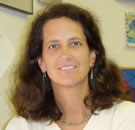 Dr.
Sautter received her Ph.D. in geological sciences at the University
of South Carolina in 1990. Her research focused on the ecology and
stable isotopic composition of modern planktonic foraminifera for
use in paleo-climate studies. After a Post-Doc at Lamont-Doherty Earth
Observatory, she became a geology department faculty member at the
College of Charleston, SC in 1992. Dr. Sautter (known by her students
as "Doc") teaches classes in marine and coastal geology
and general marine science to undergraduates, graduate students and
K-12 teachers. For the past two years, Leslie has been on a research
sabbatical with funding from the NOAA National Ocean Service. As part
of the NOAA work, she established Project Oceanica at the College
of Charleston. Oceanica's mission is to translate scientific results
from research and exploration activities occurring in the South Atlantic
Bight (SAB), and to make these results available to a broad audience
of users through development of web-based educational resources.
Dr.
Sautter received her Ph.D. in geological sciences at the University
of South Carolina in 1990. Her research focused on the ecology and
stable isotopic composition of modern planktonic foraminifera for
use in paleo-climate studies. After a Post-Doc at Lamont-Doherty Earth
Observatory, she became a geology department faculty member at the
College of Charleston, SC in 1992. Dr. Sautter (known by her students
as "Doc") teaches classes in marine and coastal geology
and general marine science to undergraduates, graduate students and
K-12 teachers. For the past two years, Leslie has been on a research
sabbatical with funding from the NOAA National Ocean Service. As part
of the NOAA work, she established Project Oceanica at the College
of Charleston. Oceanica's mission is to translate scientific results
from research and exploration activities occurring in the South Atlantic
Bight (SAB), and to make these results available to a broad audience
of users through development of web-based educational resources. 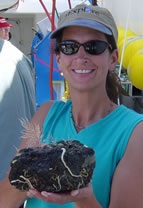
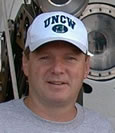 Growing
up in New England, we often went to the seashore to get away from
the crowds. I spent many hours looking out across the ocean wondering
about the world underneath the waves. I sensed but did not realize
that much of the world’s oceans were and still are today, Earth’s
last frontiers. Less than 5% of the world’s oceans have been
explored.
Growing
up in New England, we often went to the seashore to get away from
the crowds. I spent many hours looking out across the ocean wondering
about the world underneath the waves. I sensed but did not realize
that much of the world’s oceans were and still are today, Earth’s
last frontiers. Less than 5% of the world’s oceans have been
explored. 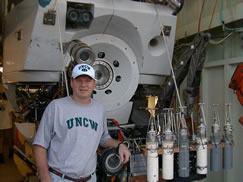 and
management issues are a high priority for us. The Oculina MPA is the
first area in federal waters to be closed from FL to New England.
There is much to do to establish a baseline of conditions in the reserve,
and then monitor recovery of coral and fish populations. As the Mission
Coordinator, and co-investigator, I will oversee all operations and
serve as liaison between the science party and operations team (ship's
crew and ROV crew). I am also responsible for continued development
of the Oculina Geographic Information System-- a map-based database
we are using to collect and integrate data and information on the
Banks over the past two decades (see http://www.uncw.edu/oculina for
Web version).
and
management issues are a high priority for us. The Oculina MPA is the
first area in federal waters to be closed from FL to New England.
There is much to do to establish a baseline of conditions in the reserve,
and then monitor recovery of coral and fish populations. As the Mission
Coordinator, and co-investigator, I will oversee all operations and
serve as liaison between the science party and operations team (ship's
crew and ROV crew). I am also responsible for continued development
of the Oculina Geographic Information System-- a map-based database
we are using to collect and integrate data and information on the
Banks over the past two decades (see http://www.uncw.edu/oculina for
Web version).